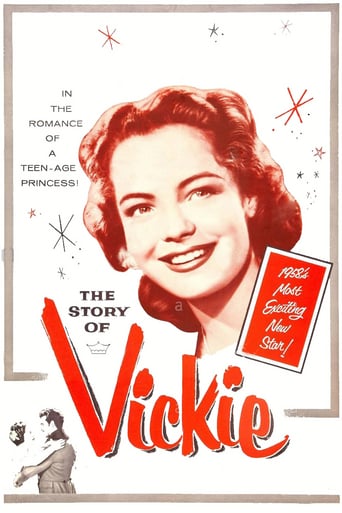boblipton
In between saving the Austro-Hungarian Empire for her screen husband as Sissi, Romy Schneider took the time out to rule Great Britain in her own right. Hereshe humbly but effortlessly wins the hearts of all (except for her controlling mother, of course) with her fearless determination to read newspapers and do the right thing.In order to put her off from interfering too much with their running things, her ministers decide to marry her off to Prince Albert, whom she has never met; she objects, as does Albert. Fortunately, G*d watches over fools and constitutional monarchs, and they are both hiding out in the slums of Windsor, where rough seafaring men play Stephen Foster tunes, where they can meet cute and fall in love without interfering with the fiction that this was anything but a love-match in any version of reality.It's another of the cream-puff costume dramas that Ernst Marischka wrote and directed Miss Schneider in. Here, various high-class locations around Vienna stand in for various high-class locations around Britain. The Austrian audiences must have lapped up the luxury after the devastation of two world wars over forty years.
dbdumonteil
Just made before Empress Elizabeth's famous trilogy ,this story like biopic of Queen Victoria's salad days retains the same obsolete charm.Not only it features Romy Schneider and her mother Magda (who,oddly,does not play her mother here but a baroness,the queen's lady-in-waiting and confident) ,but it depicts the meeting Albert /Victoria as the director (Ernst Marischka who directed the four movies)would do with Elizabeth and Francis Joseph: here they meet in an inn where Johann Strauss is playing his famous waltzes on the piano;in "Sissi" ,the heroine goes fishing and catches ... her future husband!A rather daring -for the time- line in the dialog:Victoria would like to know the meaning of the word "rape" and her mentor can't explain.In "Sissi " there would not be such a thing.That said,although "Madchenjähre" is quite pleasant,it is not as buoyant,as charming and as compelling as "Sissi"
Andres Salama
In one of her first movies, Romy Schneider shines as young queen Victoria of Britain, as she is suddenly put into the throne at the age of 18, learns to govern despite the machinations of the politicians, and eventually romances and marries Prince Albert of Saxony. Kitschy and campy (though surprisingly faithful to the real events), this romantic piece is irresistible. Seeing this movie about British royals spoken in German adds to its quaint charm. On that front, one wonders why an Austrian movie was made about an English queen; but then one remembers that in 1954, Austria was still under occupation by allied troops, including British ones. Maybe this was one of the reasons for the existence of this film.
Marcin Kukuczka
Ernst Marischka, one of the most respected Austrian directors of that time, made films full of beautiful scenes, delicate love and with respect to all that is precious in life. Nowadays, if people should hear about him, they associate the name of Marischka with SISSI trilogy (1955,1956,1957). However, he made other excellent films like DAS DREIMADERLHAUS (1958), EMBEZZLED HEAVEN (1958) and definitely this one, MADCHENJAHRE EINER KONIGIN showing the young years of queen Victoria. Although it deals with a slightly different theme than SISSI films, I do not see many differences between this movie and SISSI. They are strikingly similar.The movie is almost identical. The style, the music, the photography. In fact, the crew are almost the same. Anton Profes, Bruno Mondi!The cast... Romy Schneider's one of the first main roles. It was a lovely introduction to her role of Sissi since this film was made one year before the first part of the trilogy about the Austrian empress. It is also a film where Romy plays with her mother, Magda Schneider. But Ernst Marischka was not the first director who cast Romy to play with her mum. Romy's debut, WENN DER WEISSE FLIEDER WIEDER BLUHN (1953) was her performance with her mother, too. Therefore, there were some voices that Romy began her Austrian career on the bases of her mother's fame. Indeed, there is some truth in it.Again, like in SISSI, this film shows love very gently. Victoria meets Prince Albert in a little inn in Dover. Their sympathy is based on pure exaltation in dance and gentle smiles. And now...? What would it be showed like? Only sex... But is it the only thing love is based on?I am grateful to Ernst Marischka for these movies. They had a soul and a message. Some people may call them kitschy, but I will never give up admiring these films. They are IMPRESSIVE!!! UNFORTUNATELY, HIGHLY UNDERRATED!


